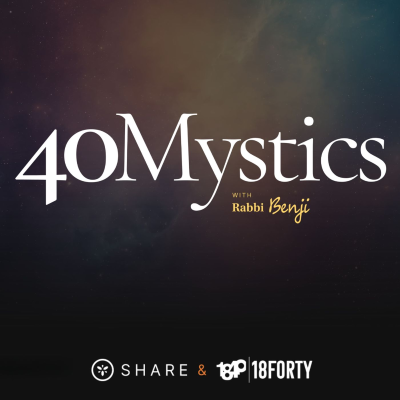
18 Questions, 40 Mystics
Englisch
Gratis en Podimo
Kostenlos hören bei Podimo
Starte jetzt und verbinde dich mit deinen Lieblingspodcaster*innen
- Vertraut von über 1 Mio. deutschen Hörer*innen
- Über 1.000 lokale Podcasts und Shows – nur bei Podimo
- Keine Zahlung nötig
Mehr 18 Questions, 40 Mystics
18 Questions, 40 Mystics is a new podcast and video series by 18Forty and Share interviewing the leading rabbis, teachers, kabbalists, and artists immersed in the world of Jewish mysticism. Join Rabbi Benji Levy as he asks 18 of the most existential questions to 40 mystics from around the world. If you are looking to dive into the world of spirituality, inspiration, and pnimiyut, then this is the podcast for you.Have questions or comments? Shoot us an email at info@18forty.org.
Alle Folgen
58 FolgenJoey Rosenfeld: "All Jews by definition are mystics'
Rav Joey Rosenfeld’s entryway into mystical thought began with the writings of Franz Kafka and Albert Camus. Discussing Jewish mysticism with Rav Joey is not just a conversation about ancient texts and ideas, but it is a journey into the soul, wherein he describes how mystical principles can transform relationships, heal trauma, and guide us in a modern world. Rav Joey Rosenfeld is a practicing psychotherapist in the field of addiction, focusing on the interface between philosophy, spirituality, and psychology. He regularly gives shiurim on Jewish philosophy, Kabbalah, and the inner workings of the human soul. Here, he sits down to discuss 18 questions on Jewish mysticism, including the various dimensions of redemption and the paradoxical nature of God. Here are our 18 questions: What is Jewish mysticism? How were you introduced to Jewish mysticism? In an ideal world, would all Jews be mystics? What do you think of when you think of God? What is the purpose of the Jewish people? How does prayer work? What is the goal of Torah study? Does Jewish mysticism view men and women the same? Should Judaism be hard or easy? Why did God create the world? Can humans do something that is against God’s will? What do you think of when you think about Moshiach? Is the State of Israel part of the final redemption? What is the greatest challenge facing the world today? How has modernity changed Jewish mysticism? What differentiates Jewish mysticism from the mysticism of other religions? Does one need to be religious to study Jewish mysticism? Can mysticism be dangerous? How has Jewish mysticism affected your relationships with yourself and with others? What is a Jewish teaching that you always take with you?
Introducing 18 Questions, 40 Mystics with R' Benji Levy
Join Rabbi Benji Levy as he asks 18 existential questions to 40 mystics from around the world. Series launches Monday, Dec. 8. Visit 40mystics.com to learn more. A partnership between Share and 18Forty.
'There is no hope—but there is faith': 5 Israeli Thinkers on the country's future
Do you have more hope or fear for Israel and the Jewish People? We asked this question to 40 Israeli Thinkers over the last year. For the first time, come behind the scenes to Sruli Fruchter's favorite answers and the secret behind the question. Here are our top 5 answers from: 5. Gadi Taub 4. Shani Taragin 3. Rachelle Fraenkel 2. Yossi Klein Halevi 1. Anshel Pfeffer 18Forty launched its new website [https://18forty.org]! This is your address for today’s biggest Jewish questions. Please enjoy rummaging through our trove of podcasts, essays, videos, and more. Happy searching!
'The status quo cannot be maintained': 6 Israeli Thinkers on if Palestinian-Israeli peace is still possible
Do you think peace between Israelis and Palestinians will happen within your lifetime? We asked this question to 40 Israeli Thinkers over the last year. For the first time, come behind the scenes to Sruli Fruchter's favorite answers and the secret behind the question. Here are our top 5 answers from: 6. Yakov Nagen 5. Netta Barak Corren 4. Mikhael Manekin 3. Nechumi Yaffe 2. Rula Daood 1. Yoav Heller 18Forty launched its new website! This is your address for today’s biggest Jewish questions. Please enjoy rummaging through our trove of podcasts, essays, videos, and more. Happy searching!
'The government doesn't make its case': 5 Israeli Thinkers on criticizing Israel
What is the most legitimate criticism leveled against Israel today? We asked this question to 40 Israeli Thinkers over the last year. For the first time, come behind the scenes to Sruli Fruchter's favorite answers and the secret behind the question. Here are our top 5 answers from: 5. Benny Morris 4. Uri Zaki 3. Einat Wilf 2. Yishai Fleisher 1. Michael Oren 18Forty launched its new website! This is your address for today’s biggest Jewish questions. Please enjoy rummaging through our trove of podcasts, essays, videos, and more. Happy searching!















































